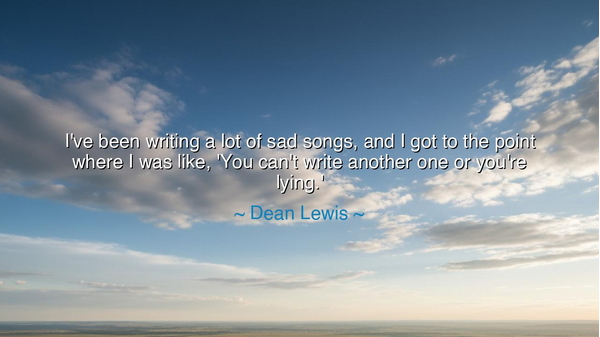
I've been writing a lot of sad songs, and I got to the point
I've been writing a lot of sad songs, and I got to the point where I was like, 'You can't write another one or you're lying.'






Hear the words of Dean Lewis, the singer who bared his heart through melody: “I’ve been writing a lot of sad songs, and I got to the point where I was like, ‘You can’t write another one or you’re lying.’” At first, these words sound like the weary sigh of an artist burdened by repetition, but within them lies a profound truth: sorrow is sacred when it is honest, but becomes hollow when forced. To create from the depths of sadness is to offer truth to the world, yet to imitate sadness when the heart has moved beyond it is to betray both the art and the soul.
The heart of this saying rests in the tension between authenticity and falsehood. For every true song of grief, there must first be a heart that has endured grief. Every lament written from lived experience carries weight; it resonates with listeners because it was born of reality. Yet when sorrow is manufactured, when the artist tries to clothe themselves in sadness that is no longer their own, the art loses its power. Lewis admits that he reached the edge of this truth: to write one more sad song without genuine sorrow would make him a liar.
The ancients understood this law of authenticity. The poet Sappho wrote of love and longing because she had lived them; her verses endure because they were truth distilled. Homer, in crafting the sorrows of Achilles and Odysseus, drew upon the eternal grief of war and exile that his people knew well. And in the East, the Chinese poet Du Fu poured into his poems the devastation of famine and rebellion he had witnessed with his own eyes. Their greatness came not from invention alone, but from sincerity. So too does Dean Lewis remind us: art must always mirror life, or it becomes false.
Consider also the story of Abraham Lincoln, who, in speeches and writings, often carried the heavy tone of sorrow. Yet his melancholy was real—born of personal losses, the death of children, and the tearing of a nation by civil war. His words endure because they were not contrived; they were soaked in the truth of his suffering. Had he spoken of grief without having endured it, his words would not have carried the same immortal weight. Just as Lewis admits, truth is the fire that keeps expression alive.
Yet there is also wisdom in the balance. If one only ever sings of sorrow, even when the heart has healed, one risks becoming chained to sadness, unable to move forward. Life, as Sterling K. Brown once said, is “everything”—it is highs and lows, despair and joy. To remain forever in one note, even the note of sorrow, is to reduce the fullness of existence. Lewis’s insight is a recognition of this: the time had come to sing not only of grief, but also of renewal, of love, of hope.
The lesson here is clear: whatever you create, whatever you speak, let it be true. If you are sad, let your sorrow pour forth honestly, for it will touch others with its authenticity. But when the sadness fades, do not cling to it for the sake of art, recognition, or habit. To pretend sorrow when it is gone is to turn your gift into an empty shell. Instead, embrace the new truth of your heart—whether it is joy, healing, or even peace—and create from that place.
Practical wisdom calls to us: live truthfully in your expressions. Do not write, sing, or speak what your heart no longer carries. If you are joyful, let joy flow; if you are weary, let weariness speak; if you are hopeful, let hope become your song. And when sorrow comes again—as it surely will in the cycles of life—let it find you ready to transform it into something honest and enduring. In this way, your voice will never ring false, and your work will always be alive with sincerity.
Thus, the words of Dean Lewis stand as both a confession and a guide: “You can’t write another sad song or you’re lying.” Let us take this to heart. For in truth, and only in truth, lies the power to move others, to heal ourselves, and to create works that endure beyond the fleeting moment. To live authentically is to honor the soul, and to create authentically is to honor all who listen.






AAdministratorAdministrator
Welcome, honored guests. Please leave a comment, we will respond soon